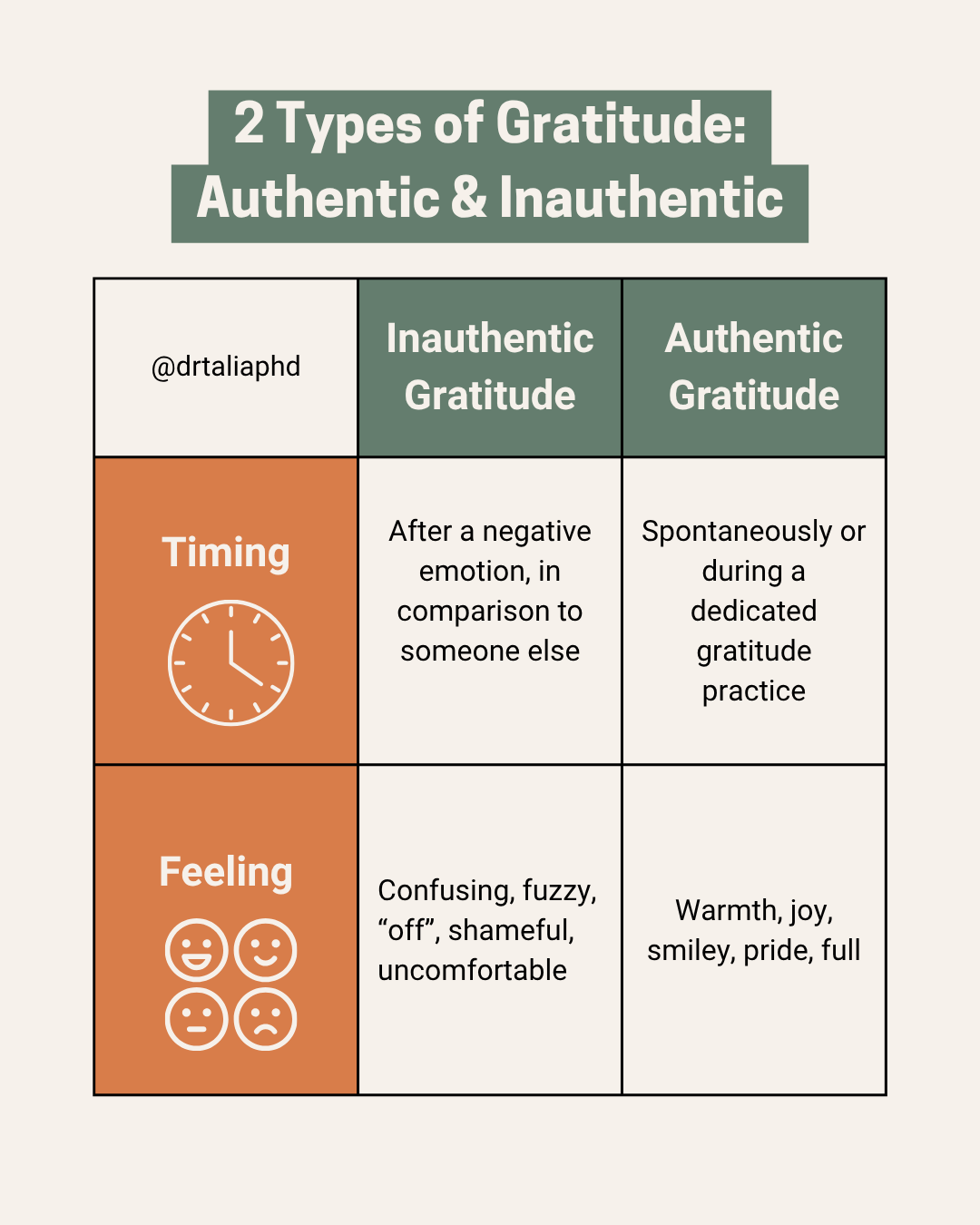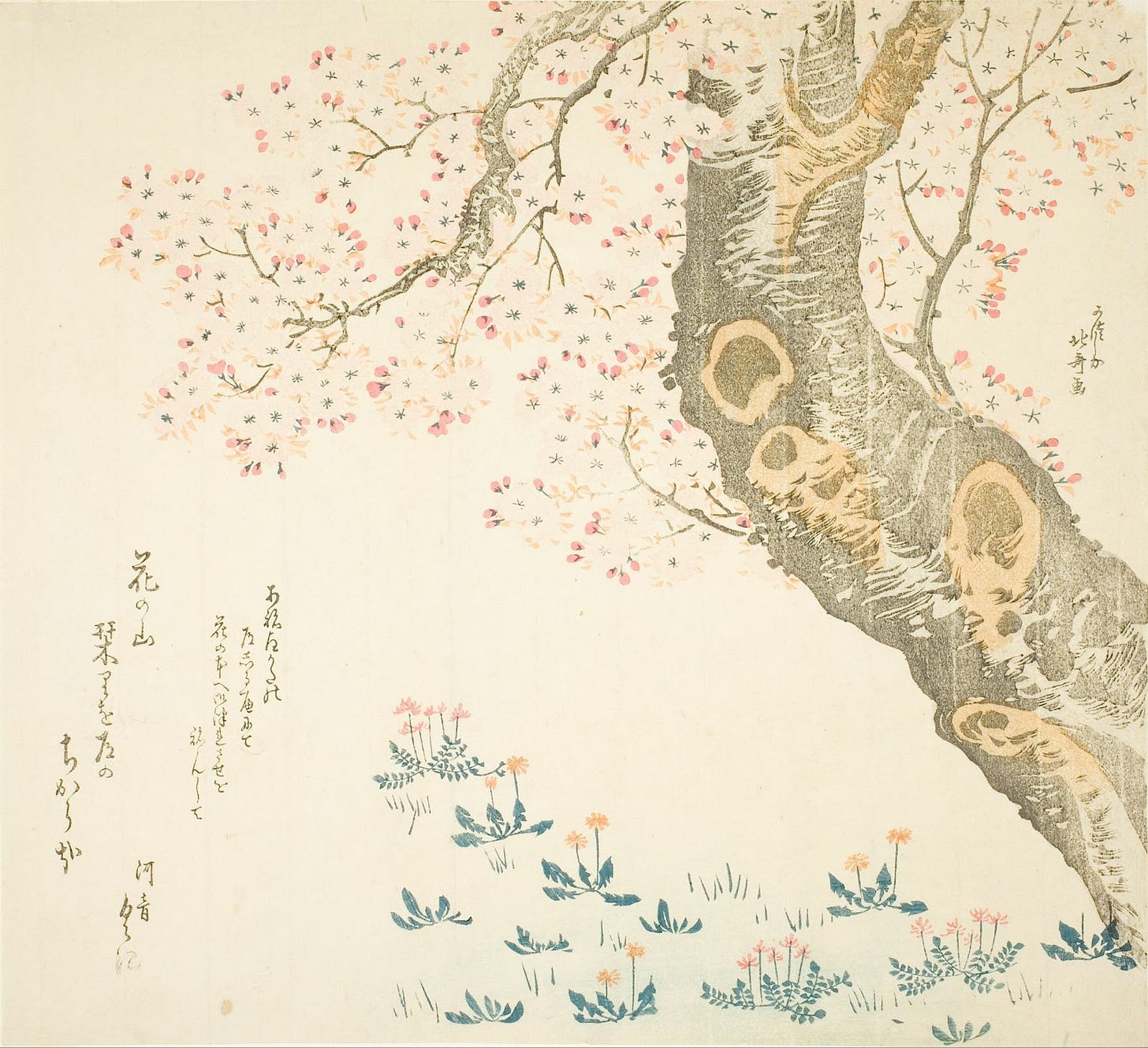Gratitude isn't always helpful
2 types of gratitude
Gratitude.
It’s been fed to us like the medicine we need, the solution to every emotional hardship, the panacea for all of life’s woes.
And it might be; the science certainly supports the benefits of gratitude.
But most people have internalized the need for gratitude in a way that shows that they understand what gratitude is, but not how to use it. Like reaching for a wrench to fix something that really needs a screwdriver; the intention is commendable, but the tool doesn’t quite get the job done.
Gratitude as emotional bypass
Instead, I notice my clients (and my loved ones) use gratitude to bypass negative emotions. Here’s what it looks like:
Step 1. A difficult emotion arises.
I am in so much pain! I can’t go to the gym today like I want to. Ughh!!
Step 2. A “should reminder” shows up.
Ah, but gratitude! I should be grateful! At least I can still go on a walk, my pain is not that bad. I’m so grateful I can go on a walk.
Step 3. Gratitude becomes entangled with the negative emotion, which blunts its positive effects.
Now, let be me clear: the ability to go on a nice walk is absolutely something to be grateful for. But, there’s a time and a place. And the time is not when you’re in the middle of experiencing a negative emotion.
Gratitude is often pushed in therapy and on social media as a solution without nuance, and this is where the harm lies. It “shoulds” people into thankfulness during moments when what they really need is self-compassion and emotional validation.
So here is my attempt at remedying this lack of nuance so that all of you can experience the sumptuous, delectable type of gratitude that the science is actually talking about. A framework to help in your daily life. (Side note: I love creating frameworks, makes me feel like an academic again :))
2 types of gratitude
There are two types of gratitude, what I call Authentic Gratitude and Inauthentic Gratitude.
Authentic gratitude feels like sun, it feels like there is a warm energy traveling through every vein and artery in my body, it feels like I will burst through the smile in my cheeks, the warmth in my heart, the exciting rumble in my stomach. Authentic gratitude arrives without force, without shame, without “shoulds”, without stern talkings-to.
Inauthentic gratitude feels like compliance, like pretending, like putting on the clothes your mom picked out for you that don’t actually feel like you. In my body, inauthentic gratitude feels tight, like pressure in the chest, weight on the shoulders, an energy of queasiness. Inauthentic gratitude is the result of societal conditioning; it does not arise naturally.
quick announcement break
The “Ask Dr. Talia” submission form is now completely anonymous! Looking forward to your questions about managing the emotional impact of illness.
ICYMI: Ask Dr. Talia #4: How do I manage illness while working?; Ask Dr. Talia #5: What if my friends aren’t supportive?
Let’s get concrete
So how do you identify what you’re feeling as authentic or inauthentic gratitude? (see simple visual below)

Well, there are four cues to scout out inauthentic gratitude in your daily life:
“Should” statements. These can be tricky because sometimes the word “should” isn’t even present, but the meaning is implied (see below).
Gratitude that jumps in too quickly after a negative emotion. If there’s no space to sit with, acknowledge, and validate the negative experience, the gratitude is likely inauthentic.
Gratitude based on comparison to someone else’s situation. If you’re using someone else’s experience as a benchmark to understand your own, that’s not authentic gratitude, that’s comparison.
Lack of positive emotion. If the gratitude doesn’t bring up some kind of positive emotion, it’s likely inauthentic, and you’re better off focusing on self-compassion.
Examples of how these type of statements look in practice:
“My pain allows me to work full-time, it’s not as bad as my friend X, I’m so grateful!”
“I should feel really grateful — I have insurance!”
“That doctor dismissed my symptoms and I feel really bad, but I’m so lucky to have access to doctors.”
Now, again: having insurance, access to doctors, and the ability to work full-time are all things to be genuinely grateful for, 1000%. The key is the timing. Does this gratitude arise naturally, or in response to a negative feeling?
I have some social commentary for you
I believe inauthentic gratitude is the result of a society that shames us into smiling through discomfort, rewarding the appearance of contentment over the reality of feeling complex emotions.
The result of pop psychology books, wellness influencers, medical professionals, and social media infographics that tell us to be thankful on demand, as if that will heal whatever we’re struggling with, instead of the messier truth: that real emotional healing comes from a willingness to be with what is no matter how uncomfortable, from the willingness to not positive spin, not silver line, not explain away every painful event. And unfortunately—there’s no quick fix to building that willingness, not even turning to gratitude.
Authentic gratitude in my life
I experience authentic gratitude daily. Multiple times daily most days.
When I wake up in the morning, I open my blinds, look out the window, say good morning to New York City, and then can’t help but be filled with a gratitude that wraps my body in a blanket of satiety.
When I’m stressed about my healthcare or in pain, I allow myself to fully feel the anxiety, fear, or anger in that moment. And then, when I’m riding the bus to meet a new cardiologist, I can feel truly thankful for access to care.
Please don’t take away from this essay that you shouldn’t feel grateful, you absolutely should find the ways gratitude fits into your life. Because when you connect to authentic gratitude, the full, lush vitality of life opens up, and it’s only then that gratitude becomes the remedy it’s promised to be.
I’m grateful for all of you today, authentically!
Sending lots of love for joy and healing always <3,
Dr. Talia
Reflection for you: Do you tend towards authentic or inauthentic gratitude? What would an authentic gratitude practice look like to you?
More ways to connect with me:
🌻 1:1 Coaching Approach and Packages — helping you reconnect to your body and find a joyful and balanced life, illness included.
🌻 Discovery Call (Free, 15 min) — A space to explore whether working together is the right fit.
send questions to drtaliaphd@gmail.com.
Want to find me other places?
On Instagram; Meditate with me on Aura Health; My Website
Some previous posts you may enjoy:
i’m tired of focusing on my health; you can be nice to yourself during a flare; chronic illness will break your heart





I've pretty much ignored the "calling" to gratitude because it felt insincere to me from the beginning. Yes, I also have moments of "real' gratitude, but they don't occur often. What I have ended up doing instead is looking for "possibilities." This works much better for me and for my clients than gratitude. You can still look for possibilities on days when nothing goes right. Gratitude, not so much.
THIS 🙌
All. Day. Long.
This is something I'm still working on. I do feel authentic gratitude and it's GORGEOUS but inauthentic gratitude still gets me especially when I'm struggling... because then I start thinking 'I'm so fortunate and well cared for, I SHOULD be feeling grateful for X, Y and Z' ... and it can spiral from there if I don't step in with compassion and grace for myself...
Thank you for sharing this and helping us all 🙏💖